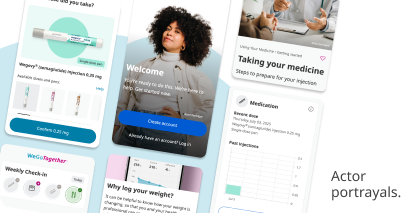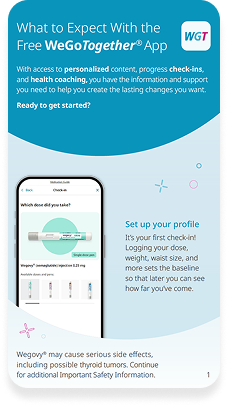In combination with diet and exercise to help adults with either obesity or overweight with weight-related medical problems, to lose excess body weight and keep it off
Get Personalized Support With WeGoTogether®
If you have a prescription for Wegovy®, WeGoTogether® is here for you. WeGoTogether® is free support that helps you stick to your goals through progress tracking, tips and reminders, and optional coaching.

Get the free WeGoTogether® app


Get the free WeGoTogether® app
Scan the QR code to download today.
What makes the WeGoTogether® app different?
From the maker of Wegovy®, the WeGoTogether® app gives you:
Personalized tips and tools to inspire long-term change
The WeGoTogether® app has articles and guides to help you with taking Wegovy® and eating well. You’ll also get ideas for mindful living, making movement fun, and much more. Choose what works best for you and your treatment goals.
Progress and milestones you can track
Weekly check-ins let you see your progress over time and share it with your health care professional during your appointments. You can track your dosing info, weight and waist measurements, and appetite.
Coaching you can count on
Deepen your support experience in a safe group setting with free health coaching. Health coaches work with your unique needs to help you reach your goals.

Get the most out of WeGoTogether®
Download this road map to get a detailed understanding of what you can expect from the WeGoTogether® app.
Take a peek at some of the 70+ articles on WeGoTogether®
TAKING WEGOVY®

Tips for using your Wegovy® pen
These tips can help you create a routine for using your pen. Read more >

Keeping an eye on common side effects
When you’re taking Wegovy®, you may experience side effects. Read more >

The deal with dosing: Taking Wegovy®
As you start using the different Wegovy® pens, you might wonder why you increase your dose of Wegovy® over time. Read more >
LIFESTYLE

Protein packs a punch
Learn about the role of protein as you pursue your weight-management goals. Read more >

What mindful eating means
Mindful eating is a practice you can master to help you stay on track with lifestyle goals. Read more >

Build your new habit. And make it last.
Ready to create a new habit? With patience and practice, you can build a new habit to support your weight-management goals. Read more >

Exercise that doesn’t feel like exercise
Being active doesn’t have to mean hitting the gym or rolling out the yoga mat. See what else you can do to keep moving. Read more >

Finding your people
Get tips for surrounding yourself with people who can help you move toward your goals and cheer you on. Read more >

Acknowledging struggles and self-criticism
Learn about what shapes your self-image, and how you can create a healthy view of yourself to support your goals. Read more >

Download the free WeGoTogether® app for articles like this and more content added weekly
Scan the QR code to download today.













